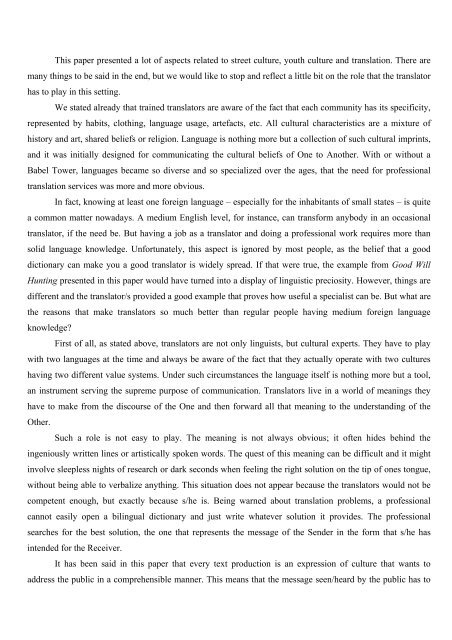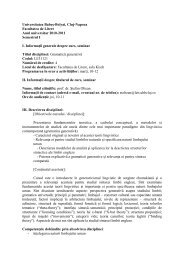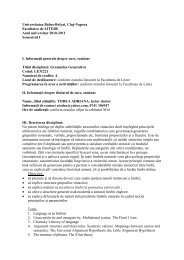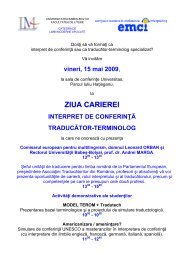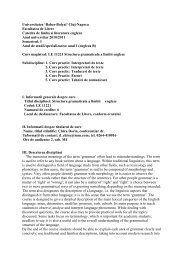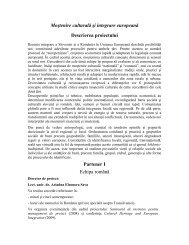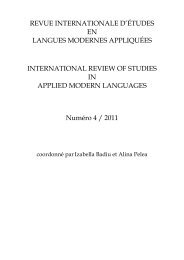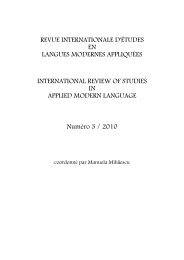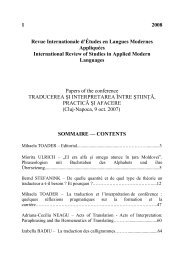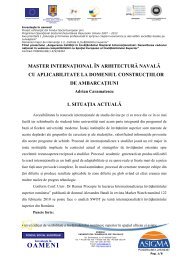Dimensiuni ale limbajului n context carceral
Dimensiuni ale limbajului n context carceral
Dimensiuni ale limbajului n context carceral
You also want an ePaper? Increase the reach of your titles
YUMPU automatically turns print PDFs into web optimized ePapers that Google loves.
This paper presented a lot of aspects related to street culture, youth culture and translation. There are<br />
many things to be said in the end, but we would like to stop and reflect a little bit on the role that the translator<br />
has to play in this setting.<br />
We stated already that trained translators are aware of the fact that each community has its specificity,<br />
represented by habits, clothing, language usage, artefacts, etc. All cultural characteristics are a mixture of<br />
history and art, shared beliefs or religion. Language is nothing more but a collection of such cultural imprints,<br />
and it was initially designed for communicating the cultural beliefs of One to Another. With or without a<br />
Babel Tower, languages became so diverse and so specialized over the ages, that the need for professional<br />
translation services was more and more obvious.<br />
In fact, knowing at least one foreign language – especially for the inhabitants of small states – is quite<br />
a common matter nowadays. A medium English level, for instance, can transform anybody in an occasional<br />
translator, if the need be. But having a job as a translator and doing a professional work requires more than<br />
solid language knowledge. Unfortunately, this aspect is ignored by most people, as the belief that a good<br />
dictionary can make you a good translator is widely spread. If that were true, the example from Good Will<br />
Hunting presented in this paper would have turned into a display of linguistic preciosity. However, things are<br />
different and the translator/s provided a good example that proves how useful a specialist can be. But what are<br />
the reasons that make translators so much better than regular people having medium foreign language<br />
knowledge?<br />
First of all, as stated above, translators are not only linguists, but cultural experts. They have to play<br />
with two languages at the time and always be aware of the fact that they actually operate with two cultures<br />
having two different value systems. Under such circumstances the language itself is nothing more but a tool,<br />
an instrument serving the supreme purpose of communication. Translators live in a world of meanings they<br />
have to make from the discourse of the One and then forward all that meaning to the understanding of the<br />
Other.<br />
Such a role is not easy to play. The meaning is not always obvious; it often hides behind the<br />
ingeniously written lines or artistically spoken words. The quest of this meaning can be difficult and it might<br />
involve sleepless nights of research or dark seconds when feeling the right solution on the tip of ones tongue,<br />
without being able to verbalize anything. This situation does not appear because the translators would not be<br />
competent enough, but exactly because s/he is. Being warned about translation problems, a professional<br />
cannot easily open a bilingual dictionary and just write whatever solution it provides. The professional<br />
searches for the best solution, the one that represents the message of the Sender in the form that s/he has<br />
intended for the Receiver.<br />
It has been said in this paper that every text production is an expression of culture that wants to<br />
address the public in a comprehensible manner. This means that the message seen/heard by the public has to


